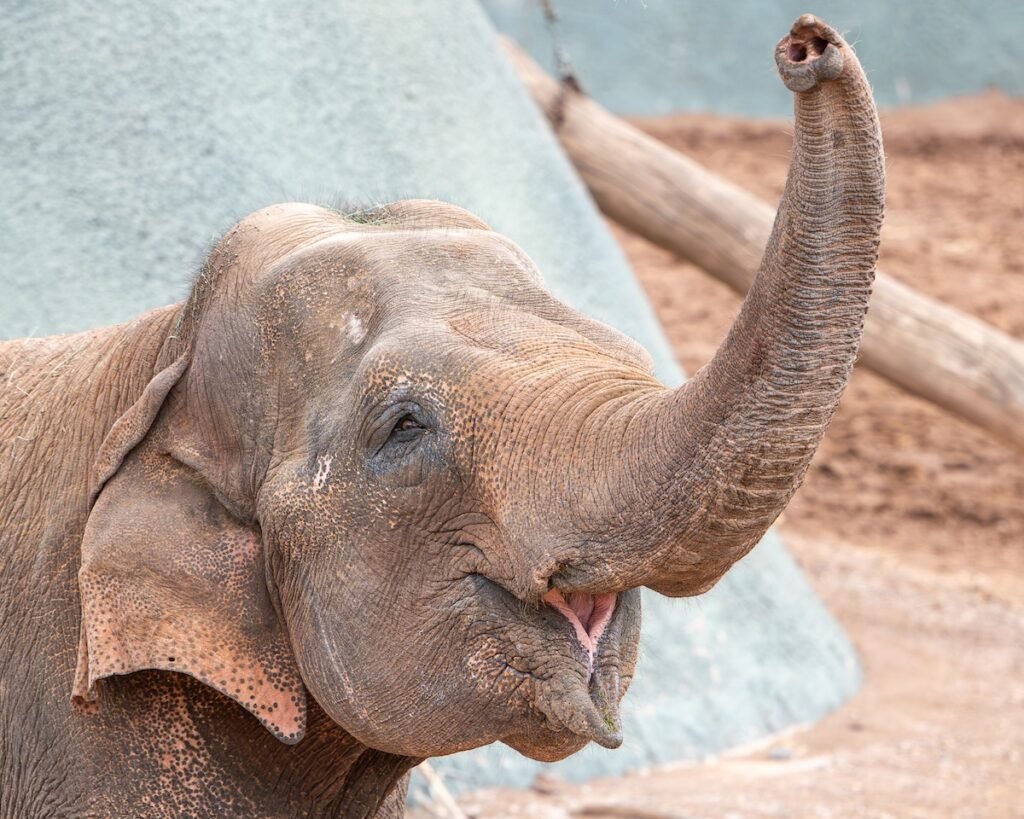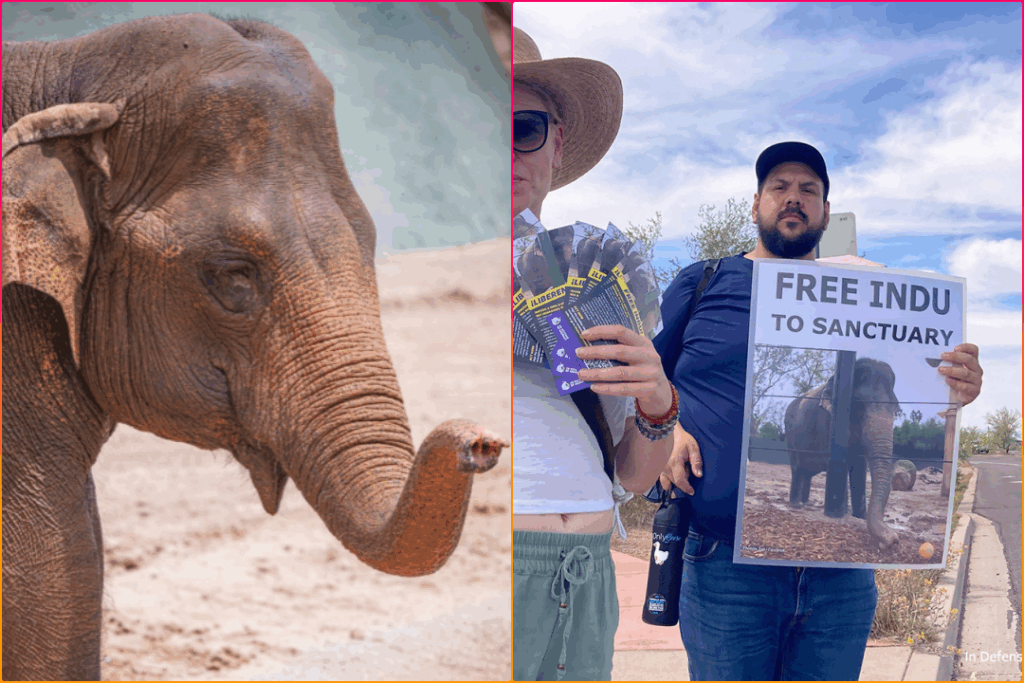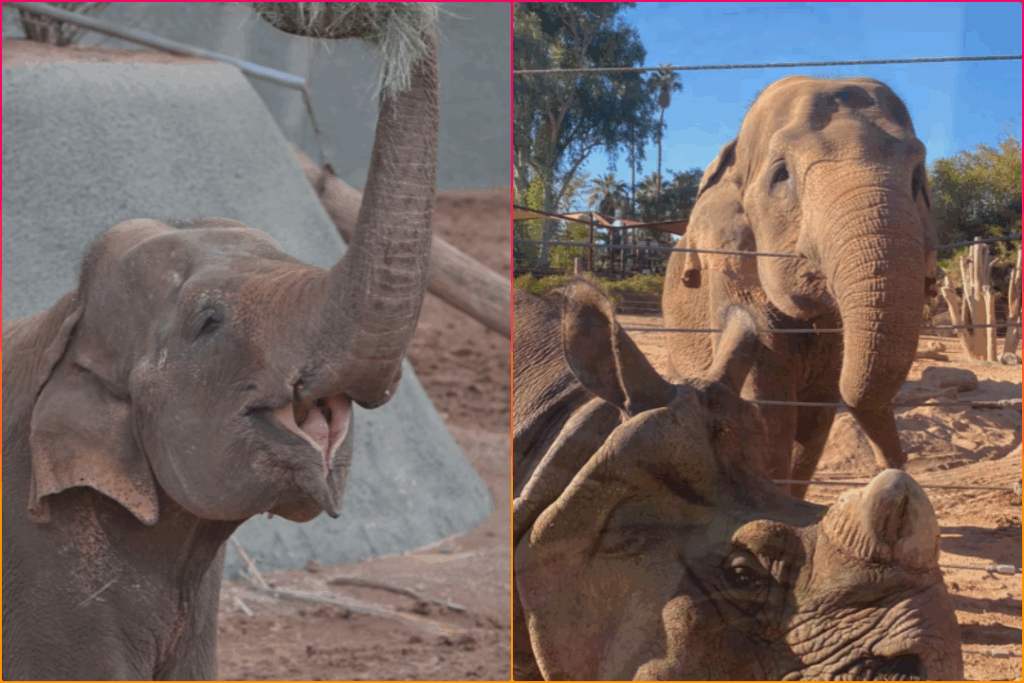DD ANIMAL NEWS: 10.5.2025: Just a week ago, animal activists led by the organization “In Defense of Animals” attempted to rally support for Indu, an ailing 59-year-old Asian elephant kept at the Phoenix Zoo. The pachyderm was expected to be killed by the zoo authorities, but petitions called for her release to live out her last days in a sanctuary. Unfortunately, the zoo was adamant in following their own protocol euthanizing the animal. Indu was the last elephant to be kept in captivity at Phoenix Zoo which has now shut down their elephant exhibit. Interestingly, Phoenix Zoo was featured in the IDA’s top 10 list of worst zoos for elephants in the USA.
The recent passing of Indu has sparked a wave of grief and renewed scrutiny over the treatment of aging elephants in captivity. Indu’s life story, marked by decades of confinement and solitude, has become a focal point in the broader conversation about animal welfare and the role of zoos in modern society.
A Life Spent in Captivity

Indu’s journey began in 1965 when she was taken from the wild at just one year old. Over the years, she was housed in various zoos across the United States, ultimately arriving at the Phoenix Zoo in 1998. There, she became the last remaining elephant after the deaths of her companions, Reba and Sheena, leaving her in solitary confinement for several years.
Despite her status as a beloved figure among zoo visitors and staff, Indu’s living conditions raised concerns among animal welfare advocates. Her enclosure lacked features essential for her well-being, such as a deep pool for bathing and adequate shade to protect her from the harsh Arizona sun. These deficiencies, coupled with her isolation, led to behaviors indicative of psychological distress, including repetitive swaying and bobbing.
Health Decline and Euthanasia
In her later years, Indu suffered from chronic osteoarthritis and other age-related ailments. The Phoenix Zoo implemented various treatments, including hydrotherapy, laser therapy, and physical therapy, to manage her declining health. However, her condition continued to deteriorate, leading to a significant decrease in mobility. On May 8, 2025, the zoo made the decision to humanely euthanize Indu, citing the progression of her health issues and the impact on her quality of life.
Activists’ Pleas for Sanctuary

Prior to Indu’s euthanasia, animal rights organizations, including In Defense of Animals, had been advocating for her transfer to a sanctuary where she could spend her remaining years in a more natural and enriching environment. On April 12, 2025, activists held a rally at the Phoenix Zoo, delivering a petition with over 22,000 signatures urging the zoo to relocate Indu to a reputable sanctuary.
These appeals were grounded in the belief that Indu deserved the opportunity to experience a life beyond the confines of her enclosure, with access to open spaces, social interaction with other elephants, and the freedom to engage in natural behaviors. Despite these efforts, the zoo maintained its decision to keep Indu on-site until her death. Speaking to the media during the ongoing movement, Courtney Scott, Elephant Consultant for In Defense of Animals was quoted to have said “The Phoenix Zoo should not wait for Indu to die — or worse, actively kill her. Sanctuary should be considered as a humane alternative,” said . “She still has time to experience the joy of walking on grass, bathing in deep water, and forming bonds with other elephants. Indu’s life matters, and we must give her the dignity she has been denied for far too long.”
The organization also reported deeply disturbing details on how the zoo planned to dismember and cut the elephant on half to facilitate easy removal.
Phoenix Zoo Issues A statement
Following Indu’s passing, the Phoenix Zoo released a statement expressing deep sorrow and highlighting her role as an ambassador for her species. Zoo officials emphasized the care provided to Indu throughout her life and noted that her age exceeded the average life expectancy for Asian elephants in accredited zoos.
The zoo also announced plans to close its elephant exhibit, indicating a shift in its approach to housing large, social animals. This decision aligns with a growing trend among zoos to re-evaluate the ethics and practicality of keeping elephants in captivity, particularly when adequate space and social structures cannot be provided.
Broader Implications for Elephant Welfare

Indu’s story has reignited discussions about the welfare of elephants in captivity and the responsibilities of zoological institutions. Advocates argue that elephants, known for their intelligence and complex social needs, often suffer in environments that cannot meet their physical and psychological requirements. The call for transferring such animals to sanctuaries reflects a growing consensus that alternative solutions are necessary to ensure their well-being.
The case of Indu serves as a poignant reminder of the challenges faced by captive elephants and the importance of ongoing advocacy for their humane treatment. As public awareness and concern for animal welfare continues to rise, institutions are increasingly being held accountable for the conditions in which they keep their animals.
Joyce Scarborough
Friday 9th of May 2025
STOP MURDERING INNOCENT ANIMALS!!!!!